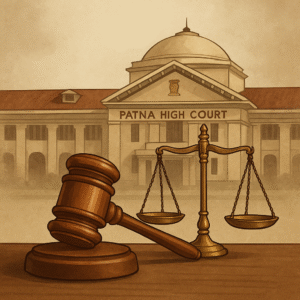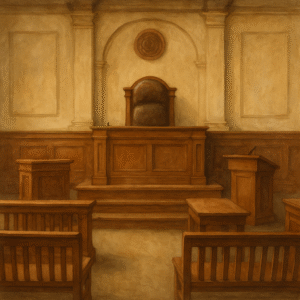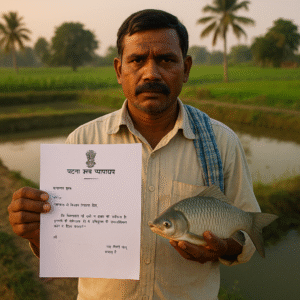Simplified Explanation of the Judgment
In a recent decision, the Patna High Court set aside a tax demand order issued against a business entity due to a fundamental lapse: the taxpayer was never properly informed about the show-cause notice and had no chance to respond.
The case revolved around a limited liability partnership firm that had received a tax, interest, and penalty order under Section 73 of the Central Goods and Services Tax (CGST) Act, 2017, and the corresponding Bihar GST Act. This order dated 24.04.2024 was based on what the authorities claimed was a discrepancy in the tax returns filed by the business.
The discrepancy arose due to a typographical or human error in the monthly return for December 2018, where an extra digit (“9”) was mistakenly entered, inflating the figure of taxable supplies. The petitioner clarified that the error had already been reconciled in the annual return (Form GSTR-9) and the reconciliation statement (Form GSTR-9C) for the financial year 2018–19. These documents were already on the GST portal and had not been rejected or objected to by the tax authorities.
Despite this, the tax department issued a demand order without giving the petitioner any opportunity to explain or rectify the error. The only communication of the show-cause notice and its subsequent reminders was through uploads on the GST portal, without any direct intimation or official communication to the taxpayer.
The petitioner approached the High Court, challenging the demand on the grounds of violation of natural justice. The petitioner’s counsel argued that the business was unaware of the uploaded notices and reminders and should have been directly informed, especially when the order carried financial implications.
The State argued that uploading notices on the portal was sufficient under the system, and it was the taxpayer’s duty to check regularly.
The Court, however, disagreed. It observed that while electronic communication is part of the system, it must not override the principles of natural justice. The taxpayer was effectively denied a chance to be heard due to lack of proper notice.
As a result, the High Court quashed the demand order dated 24.04.2024. However, now that the petitioner is aware of the show-cause notice and reminders, the Court directed them to respond within three weeks. The tax department has been ordered to provide an oral hearing and issue a fresh order within two months from the date of receiving the petitioner’s reply.
Significance or Implication of the Judgment
This judgment has significant implications for both taxpayers and tax authorities. It reinforces that procedural fairness cannot be bypassed by technological convenience. Merely uploading a notice on a portal is insufficient unless there is verifiable delivery or communication to the taxpayer.
For businesses, this judgment emphasizes the right to a fair hearing before facing financial consequences. For tax authorities, it is a reminder to balance digital efficiency with constitutional safeguards like natural justice.
This case may guide future disputes where automated processes lead to non-intimation of critical tax communications, particularly under GST laws which rely heavily on digital platforms.
Legal Issue(s) Decided and the Court’s Decision with Reasoning
- Whether uploading a show-cause notice on the GST portal alone satisfies the requirement of communication under natural justice?
→ Court’s Decision: No. The Court held that mere portal uploads, without proper communication, violate the principle of natural justice. - Whether the petitioner was given a fair opportunity to be heard before issuance of the demand order?
→ Court’s Decision: No. The absence of official communication deprived the petitioner of a chance to respond. - Whether the writ petition is maintainable without exhausting the alternative remedy of appeal?
→ Court’s Decision: Yes. Since the principle of natural justice was violated, the Court intervened despite the existence of an appellate remedy. - What is the appropriate course of action now that the petitioner is aware of the notice?
→ Court’s Direction: The petitioner must respond within three weeks, and the tax department must give an oral hearing and decide afresh within two months.
Case Title
Shree Ram Sales LLP vs. The State of Bihar & Ors.
Case Number
CWJC No. 2768 of 2025
Coram and Names of Judges
Hon’ble Mr. Justice P. B. Bajanthri
Hon’ble Mr. Justice Sunil Dutta Mishra
Names of Advocates and Who They Appeared For
- For the Petitioner:
Mr. Gautam Kumar Kejriwal, Advocate
Mr. Alok Kumar Jha, Advocate
Mr. Mukund Kumar, Advocate
Mr. Akash Kumar, Advocate
Mr. Aditya Raman, Advocate - For the Respondents:
Mr. Vivek Kumar, Government Pleader (7)
Link to Judgment
98ebe20d-13c0-405a-a158-66d93c987b21.pdf
If you found this explanation helpful and wish to stay informed about how legal developments may affect your rights in Bihar, you may consider following Samvida Law Associates for more updates.








